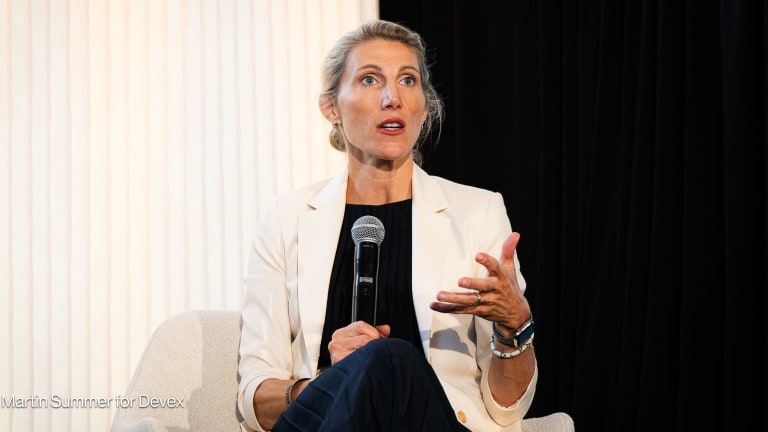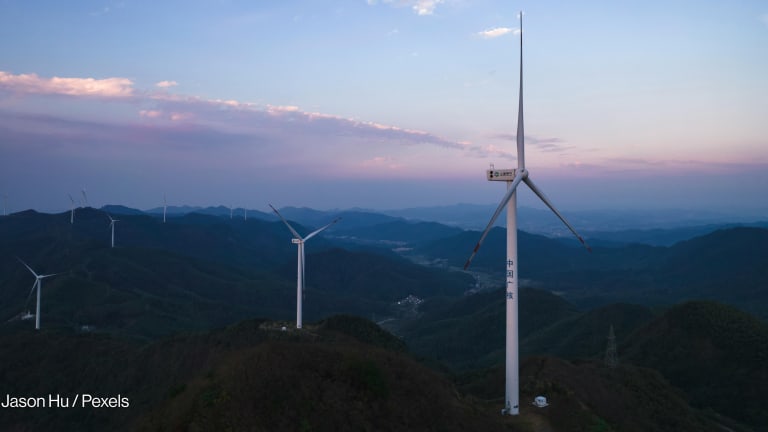
John Kerry, the U.S. special presidential envoy for climate, called on multilateral development banks to significantly step up on delivering climate finance as the Spring Meetings of the World Bank and International Monetary Fund are underway.
Sign up for Devex Invested
The must-read weekly newsletter that keeps you up to date with news about business, finance, and the SDGs.
“The multilateral development banks writ large, all of them ... need to come together, and the legislatures of the countries that are members of the charters and on the boards of all of these institutions need to step up and increase the drawing rights by dramatic amounts,” Kerry said Wednesday during a virtual event hosted by the Center for Global Development.
“These banks are the principal instrument, the principal capacity for leveraging and raising the kind of money that we need to respond in the emergency that it is,” he added.
Asked by his interviewer, journalist Judy Woodruff, whether the World Bank and IMF would treat climate issues as an emergency, Kerry said he thinks conversations at the Spring Meetings will focus on how they can augment what they are doing on climate, rather than on more dramatic change.
“I don’t think we’re at the place where we need to be,” he said, adding that no government has enough money on its own to support the kind of transition to sustainable energy that’s needed to avert further climate disaster.
As climate envoy, Kerry is responsible for climate and energy policy in the U.S. executive branch and is involved in a variety of climate discussions on behalf of the country.
Woodruff also asked Kerry whether criticism about the World Bank not stepping up on climate — much of which has been directed at bank President David Malpass — has led the U.S. administration to consider replacing the bank chief.
“I’m not aware of any move in that regard,” Kerry said, adding that he hadn’t received “any indication” that such an action was being discussed.
U.S. Treasury Secretary Janet Yellen has held several meetings with MDB presidents to push them to accelerate action on climate, Kerry said, but “some have done so, and some have not.”
Climate advocates have called for the World Bank to prohibit all investment in fossil fuels, but Kerry said he “can’t predict” if that will happen. With fossil fuels, the main issue relates to “oil and coal burning that is unabated,” with gas being a bit more “complicated,” he said.
“Gas will be part of low-income countries’ transition. I have no doubt about that, and the administration has no doubt about it,” Kerry said. The key, he added, is to make sure that gas is used as a transitional fuel while countries expand renewables and that emissions will be captured.
However, countries can’t think that they can have a “free pass” and build huge gas infrastructure to be financed over a 30-40 year time period, he said. “There’s a gas future, but it’s got to be a responsible one.”
And ultimately, he said, the determining factor for global warming is what happens in the handful of countries that account for 80% of global emissions — including China, the U.S., and India — and not the 48 sub-Saharan African countries that account for 0.55% of emissions.
Higher-income countries have struggled to meet their Paris climate commitment to provide $100 billion annually to low-income nations to help with the energy transition, but Kerry said even that amount is not nearly enough. He’s working with some of the United States’ largest banks on how they can realize their commitments and potentially reach trillions of dollars in investment.
Currently, those private institutions aren’t following through on their pledges because banks don’t have the confidence that the investments are bankable, that they will get the needed return, or that they are sufficiently de-risked, Kerry said.
“The great task in front of us right now, which we’re working on very hard, is: How do you deploy those funds? How can you de-risk?” he said. “You have to have a blended finance structure. You have to bring different parties to the table. It’s complicated, but it is doable.”
As for whether the U.S. will keep its own climate commitments, Kerry said that the administration has requested a ramp-up in climate finance and that despite Congress approving less than what was requested, he’s hopeful that climate legislation can still be passed.









